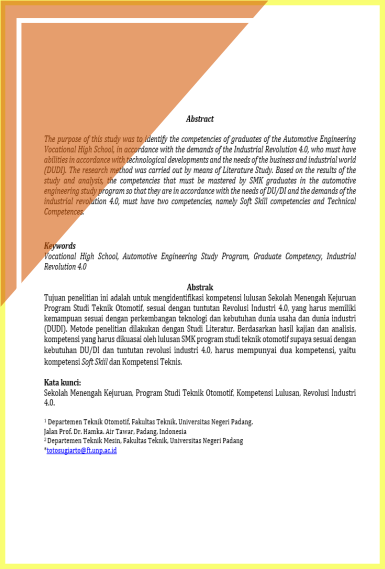Kompetensi Lulusan SMK Program Studi Teknik Otomotif Sesuai Dengan Tuntutan Revolusi Industri 4.0 : Kajian Literatur
##plugins.themes.academic_pro.article.main##
Abstract
The purpose of this study was to identify the competencies of graduates of the Automotive Engineering Vocational High School, in accordance with the demands of the Industrial Revolution 4.0, who must have abilities in accordance with technological developments and the needs of the business and industrial world (DUDI). The research method was carried out by means of Literature Study. Based on the results of the study and analysis, the competencies that must be mastered by SMK graduates in the automotive engineering study program so that they are in accordance with the needs of DU/DI and the demands of the industrial revolution 4.0, must have two competencies, namely Soft Skill competencies and Technical Competences. Entrepreneurial Spirit Soft Skill Competence, which has: (1) Leadership spirit, (2) Able to understand digital technology, (3) Mastery of communication and information media, (4) Able to control emotions, (5) Creative, and Innovative, (6) Have broad insight, (7) Ability to think critically and be able to solve problems, (8) Able to collaborate and work in teams, (9) Able to understand cultural and cultural differences, (10) Able to develop a career and be confident.
Tujuan penelitian ini adalah untuk mengidentifikasi kompetensi lulusan Sekolah Menengah Kejuruan Program Studi Teknik Otomotif, sesuai dengan tuntutan Revolusi Industri 4.0, yang harus memiliki kemampuan sesuai dengan perkembangan teknologi dan kebutuhan dunia usaha dan dunia industri (DUDI). Metode penelitian dilakukan dengan Studi Literatur. Berdasarkan hasil kajian dan analisis, kompetensi yang harus dikuasai oleh lulusan SMK program studi teknik otomotif supaya sesuai dengan kebutuhan DU/DI dan tuntutan revolusi industri 4.0, harus mempunyai dua kompetensi, yaitu kompetensi Soft Skiil dan Kompetensi Teknis. Kompetensi Soft Skill jiwa kewirausahaan, yang memiliki: (1) Jiwa kepemimpinan, (2) Mampu memahami teknologi digital, (3) Menguasai media komunikasi dan informasi, (4) Mampu mengendalikan emosi, (5) Kreatif, dan Inovatif, (6) Mempunyai wawasan Luas, (7) Kemampuan berpikir kritis dan bisa memecahkan masalah, (8) Mampu berkolaborasi dan bekerja dalam tim, (9) Mampu memahami perbedaan kultur dan budaya, (10) Mampu mengembangkan karir dan percaya diri.
##plugins.themes.academic_pro.article.details##

This work is licensed under a Creative Commons Attribution 4.0 International License.
References
[2] Joko, M. “Motivasi Mahasiswa Pendidikan Teknik Otomotif 2017 dalam Memasuki Dunia Kerja Sebagai Tenaga Kependidikan”. Skripsi. Program Studi Teknik Otomotif. Fakultas Teknik. Universitas Negeri Padang. 2022.
[3] Usman, H. & Darmono. Pendidikan Kejuruan Masa Depan. Pusat Kurikulum dan Perbukuan. Badan Penelitian dan Pengembangan. Kementerian Pendidikan dan Kebudayaan. Jakarta. 2016.
[4] Prosser, C.A. & Quigley, T.H. (1950). Vocational education in a democracy. Revised Edition. Chicago: American Technical Society.
[5] BPS. (2022). Jumlah SMK di Sumatera Barat. https://sumbar.bps.go.id/indicator/28/384/1/jumlah-sekolah-guru-dan-murid-sekolah-menengah-kejuruan-smk-di-bawah-kementerian-pendidikan-dan-kebudayaan-menurut-kabupaten-kota.html
[6] Cristyani, E. Jurusan Teknik Otomotif: Program Keahlian dan Kompetensi. Gamelab Indonesia. PT. Educa Sisfomedia Indonesia. 2021.
[7] Kemendikbud. Optimalisasi Kompetensi Lulusan SMK dalam Industri Teknologi Terapan. Direktorat Pembinaan SMK. Kementerian Pendidikan dan Kebudayaan . Jakarta. 2018.
[8] Roe, R.A., “Competencies and competence management”. Paper European Congress for W&O Psychology, Prague, May 16-19, 2001.
[9] Schwab, K. The Fourth Industrial Revolution. Crow: Business Press. 2017.
[10] Lee, J., Lapira, E., Bagheri, B., & Kao, H. Recent Advances And Trends In Predictive Manufaktur System In Big Data Environment. Manuf , Lett.1 (1), 3841. 2013.
[11] Liffler, M., & Tschiesner, A. The Internet Of Things And The Future Of Manufacturing. Mckinsey & Company. 2013.
[12] Sung, T.K., “Industri 4.0: a Korea perspective. Technological Forecasting and Social,” Change Journal, Vol.1.6, 2017.
[13] Maryanti, N & Afriana, D. “Kompetensi Siswa SMK dalam menghadapi Revolusi industri 4.0”. Prosiding Seminar Nasional Pendidikan. Program Pasca Sarjana. Universitas PGRI Palembang. 2019.
[14] Berger, R. Whitepaper: Skill Development for Industry 4.0. BRICS Business Council. 2016.
[15] Hartanto, A. Making Indonesia 4.0. Kementerian Perindustrian RI , Jakarta. 2018.
[16] Sugiono. Metode Penelitian Kuantitatif, Kualitatif, dan R&D. Bandung. Penerbit: ALFABETA.CV. Bandung. 2019.
[17] Nazir, Moh. Metode Penelitian. Bogor: Ghalia Indonesia. 2018.
[18] Maryanti, N. “Siswa SMK siap hadapi Revoludi Industri 4.0 (Kajian Praktis SMK di Provinsi Sumatera Selatan,” Tesis. Program Studi Manajemen Pendidikan. Program Pasca Sarjana. Universitas PGRI Palembang. 2019.
[19] Satria, A., & Wakid, M. “Kesiapan Perangkat Pemeblajaran dan Sarana Prasarana Dalam Implementasi Kurikulum 2013 SMK Jurusan TKR se DIY”. Jurnal Pendidikan Teknologi Otomotif XIV. 2016.
[20] Siswanto, Yusiran.Y, & Fajarudin, M. “Keterampilan Proses Sains dan Kemandirian Belajar Siswa Profil dan Setting Pembelajaran Untuk Melatihkannya”. Journal Research and Learning . 2017.
[21] Trilling, B. & Fadel, C. 21st century skill, Learning for live in Ourtimes, Jossey-Bass. A Wiley imprint. www. Josseybass.com. 2009.
[22] Pearson-Learning Curve Report . Penghargaan Shorty Tahunan ke-7 Kurva Pembelajaran Pearson .2014.

